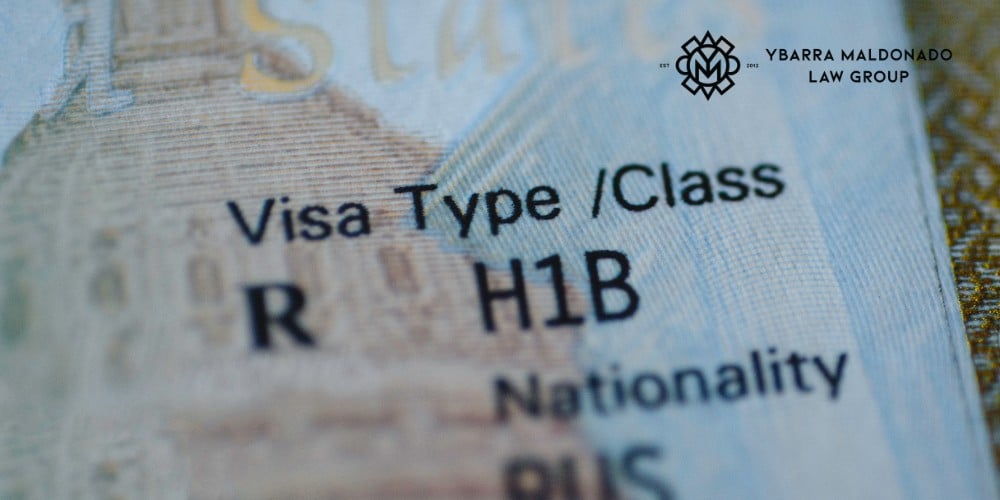H1B TRANSFER DENIED
Home » Practice Areas » Phoenix Immigration Lawyer » H1B Visa Attorney Phoenix, Arizona » H1B Transfer Denied
DON’T HESITATE TO REACH OUT TO US!
Our Law Firm is committed to becoming the best Law Firm for Latino, migrant, and Spanish speaking communities in Arizona.
What To Do If Your H1B Transfer is Denied

Recently, there has been a steady rise in the rate of H1B transfers. Some industry analysts have attributed this to new policies by the United States Citizenship and Immigration Services. Because of the increased rate of transfer denials, we’ll provide what you need to know to avoid having you H-1B transfer denied and what to do if your H1B transfer is denied.
If your H1B visa transfer was denied, contact our Phoenix immigration lawyers at Ybarra Maldonado Law Group. Call our office at 602-910-4040 today to schedule a consultation with us.
H1B Transfer Rejected
What is an H1B Transfer?
An H-1B transfer is the process of changing from one employer to another while still on an H1B status. The H-1B rule allows employees to accept a job offer from another employer in the United States during their stay. However you cannot start the new employment without first satisfying the labor and immigration requirements through H1B transfer processing. This procedure can take several months. You will need to complete this process carefully to avoid being denied. At this stage, you will need to be extremely familiar with the H1B visa transfer procedure or hire an immigration attorney who is.
Why Was My H1B Transfer Denied?
If you've submitted a petition for an H-1B transfer, you may be worried that it will be denied.
If you're working alongside an experienced immigration attorney, this will alleviate these fears. There are numbers contributing factors for getting your H1B transfer denied by the US citizenship and immigration Services office.
H1B Transfer Procedure
The procedure for an H-1B transfer is almost the same as applying to an H1B visa. The main difference is that there is no visa cap or lottery. Annually, no more than 85,000 H1B visas are granted to cap-subject petitions. However an H-1B Transfer has no such restriction. If the person is qualified, they can transfer their H-1B visas every single year.
Here are the steps for applying for an H-1B visa transfer:
Get a New Employement Offer
When you apply for a transfer, you must have a current employer in the United States. you will also need a job offer from another employer that is also in the United States. If you wish to take the new job, you can then initiate the H-1B visa process. You cannot transfer to another employer without having a new job offer.
Labor Condition Application
U.S. companies are not permitted to employ H-1B workers without a Labor Condition Application. To get the LCA, the employer needs to send an application to the US Dept of LAaby by filling form ETA 9035E. This document will show the United States government tha tthe employer does hire legal workers. This also stipulates that the employer treats the foreign workers fairly.
I-129
After getting authorization for LCA, the employer should submit an I-129 to the USCIS. Once the USCIS receives the petition, they will send a receipt number to both the employer and the employee. Both parties will get the I-797 form when the petition is approved. The form will testify that the employee is legally permitted to work for that particular employer.
1-B Transfer Documents
You’ll want to submit a copy of the following document to the USCIS:
- offer letter
- passport
- current H-1B Visa
- Form I-94
- I-797
- social security card
- qualifications
- paystubs
- tax returns (if applicable)
- updated resume
- state license (medical)
Common Reasons for H-1B Denial
Sometimes petitions for an H1B employee are denied based on insufficient submissions demonstrating that the petitioning US employer is an established and operating entity with the ability to hire, pay and provide sufficient specialty occupation work to the H1B employee.
In order to avoid having your H1B transfer denied, you’ll want to make sure that your employer provides tax documentation, financial statements, active contracts that demonstrate sufficient specialty occupation work, lease information and photographs of the premises.
A key requirement for H1B approval is providing sufficient proof that the position is a “specialty occupation” that requires a bachelor’s degree or an employee to have “specialized knowledge”.
In addition, the employee must demonstrate that the specialized knowledge he or she possess is directly relatioed to the job offered.
An H1B employer is required to designate a work site or location where the beneficiary will work. In order to avoid having your H1B transfer denied, you should submit an H1B application with the following forms of evidence: work contract agreements between the H1B petitioner and third party worksite.
Recent filing fees can easily catch you off guard and result in getting your H1-B transfer denied. You will want to make sure you up to date with current laws and regulations.
The US Department of Labor demands that emploiyers pay the “average wage paid to similarly employed workers in a specific occupation in the area of intended employement.
If your employer is unable or unwilling to pay the industry standard, this will cause your H1B transfer to be denied.
While your original H-1B petition may have been approved, any violations of immigration law on the pary of either you or your employer can cause the H1B transfer to be denied.
This is one of the more common mistakes when filing for an H1B transfer. Most send the documents and payments to the worng service center of use an un-bonded deliever service.
In order to avoid having your H1B transfer denied, check all dates and signatiures as well as your assigned service center. You should also refrain from droppin off documents by hand or through any other unofficial means of transportation. Always use UPS, USPS or Fedex.

